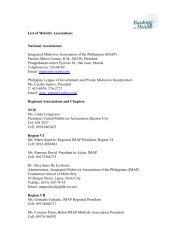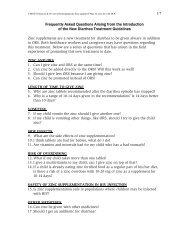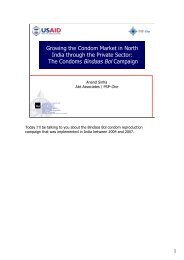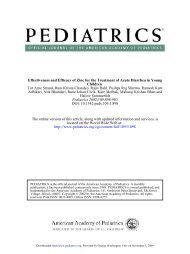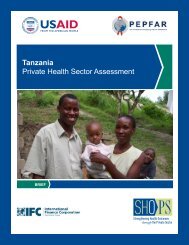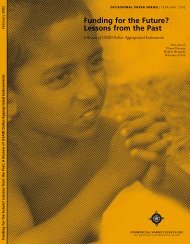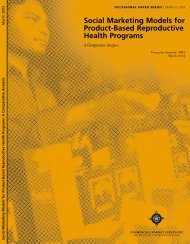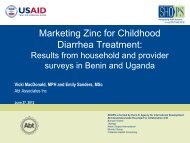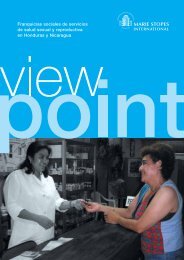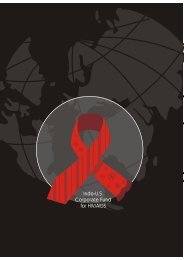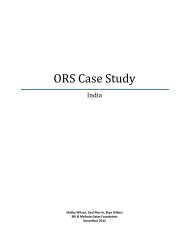Nigeria Private Sector Health Assessment - SHOPS project
Nigeria Private Sector Health Assessment - SHOPS project
Nigeria Private Sector Health Assessment - SHOPS project
You also want an ePaper? Increase the reach of your titles
YUMPU automatically turns print PDFs into web optimized ePapers that Google loves.
4. <strong>Assessment</strong> Methodology<br />
The assessment team consisted of Taara Chandani (health networks and health finance), Rich Feeley<br />
(health financing and policy and regulatory environment), and Jeff Barnes (social marketing and<br />
products). In addition the team relied on in-country expertise from the Community Participation for<br />
Action in the Social <strong>Sector</strong> Project (COMPASS) (Dr. Habib Sadauki) for provider services and quality<br />
issues. SFH (Jennifer Anyanti, Sadiq Abdulsamad, and Wale Adedji) provided information about the<br />
pharmaceutical sector. Particular attention was given to the NHIS given its planned expansion and<br />
potential to increase consumers’ ability to access health services, ensure stable income for private<br />
providers, and ensure provider quality. PSP-One already had begun supporting one of the HMOs<br />
involved in expanding access to the scheme, Total <strong>Health</strong> Trust. The scope of work for the assessment<br />
is Annex 1 of this report.<br />
Prior to the in-country assessment, team members conducted a literature review of the health situation<br />
in <strong>Nigeria</strong>, reviewed government and USAID country strategies, and studied many of the reports<br />
addressing the status of reproductive health (such as DHS 2003 and the National HIV/AIDS and<br />
Reproductive <strong>Health</strong> Survey) and related topics, including provider quality, contraceptive security, and<br />
sources of health financing. While this assessment focuses on family planning rather than HIV/AIDS,<br />
as many of the issues for the private sector in HIV/AIDS are the same (such as product supply, human<br />
resources, and quality assurance) a number of HIV/AIDS reports and organizations were consulted as<br />
well. A bibliography of reports and documents consulted is in Annex 2.<br />
During the in-country assessment, the team interviewed informants from regulatory bodies and<br />
professional associations. Unlike the public sector, which has well-defined structures and entry points,<br />
the private health sector is often loosely organized. Therefore regulatory bodies and professional<br />
associations are usually the best places to start when assessing issues affecting a broad range of private<br />
providers. In <strong>Nigeria</strong> few private providers operate in group or corporate settings that allow for<br />
sharing resources and economies of scale. The exceptions to this generalization are the HMOs and<br />
the faith-based organizations that are a part of the Christian <strong>Health</strong> Association of <strong>Nigeria</strong> (CHAN).<br />
CHAN has more than 350 member institutions, many of which share the benefits of procuring drugs<br />
and supplies through Christian <strong>Health</strong> Association of <strong>Nigeria</strong>-Pharmacy Procurement (CHANPHARM).<br />
HMO networks do not pool procurement or share facilities, but they are beginning to share training<br />
resources. The providers interviewed were selected with a view to getting a wide range of scopes of<br />
practice and, therefore, included specialists, general practitioners, nurses, midwives, traditional birth<br />
attendants, pharmacists, and patent medicine vendors (PMVs). More attention was given to private<br />
commercial providers than private non-governmental or faith-based providers.<br />
Because of time constraints, the assessment team could not visit all of the sites or meet with all of<br />
the people necessary to make a national assessment. Visits were limited to Abuja, Kano, and Lagos. In<br />
Kano and Lagos, however, the team did visit providers in their clinics, hospitals, pharmacies, and PMV<br />
stores to better understand the conditions in which providers work. To understand the pharmaceutical<br />
distribution system, site visits were made to the wholesale markets in Kano and Lagos where selected<br />
wholesalers were interviewed. The complete schedule of meetings is in Annex 3.<br />
9



